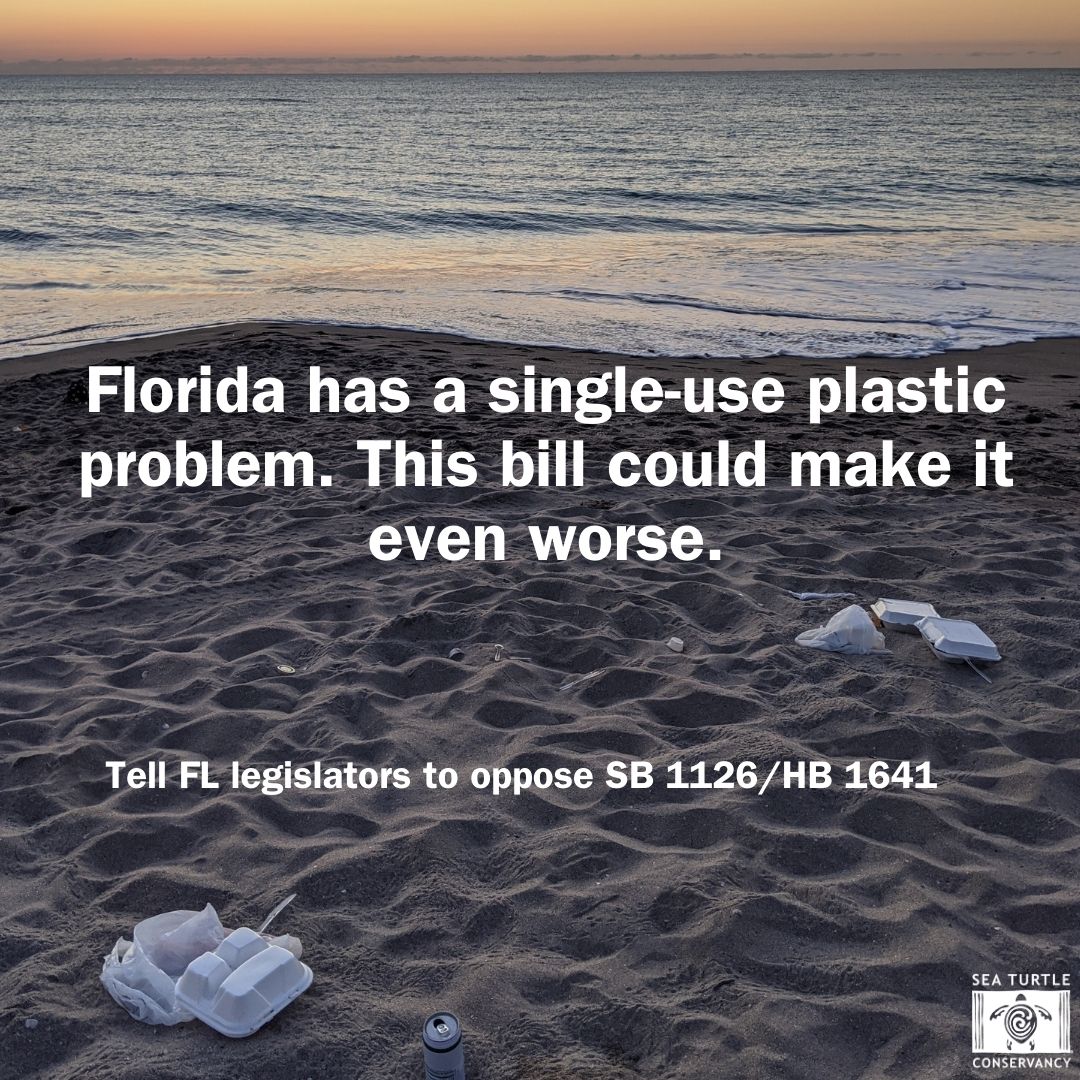
A bill moving quickly through the Florida Legislature, SB 1126/HB 1641 – Regulation of Auxiliary Containers, would ban all local governments in Florida from regulating any kind of container that is used to transport merchandise, food, or beverages, including single-use plastic. The bill also proposes to cancel the update of the State’s retail bag study, which would analyze the need for new or different regulation of auxiliary containers, wrappings, or disposable plastic bags used by consumers to carry products from retail establishments.
The science is clear that plastic pollution is a major threat to sea turtles at every life stage. Microplastics are having an impact on sand incubation temperatures[1]; hatchlings are consuming it as soon as they leave the nest and make it to sea[2]; and adults are ingesting plastic at an alarming rate, leading to mortality.[3] The only way to effectively reduce this threat is to cut off plastic pollution at the source. Local governments across the State have witnessed this need and responded accordingly by limiting single-use plastic, foam, and more. This bill could make it even harder for Florida’s threatened and endangered sea turtles to recover.
In addition to protecting the marine environment, reducing plastic pollution makes economic sense. According to the Florida Department of Environmental Protection, recreational activity along our coasts brings in hundreds of billions of dollars and supports hundreds of thousands of jobs each year.[4] Millions of people visit the State each year to enjoy our beaches, springs, lakes, and rivers; their patronage is dependent on the health of these iconic natural areas. By allowing plastic pollution to enter our environment without limits, the value of our natural resources to visitors will be greatly diminished.
Finally, the passage of this bill could prevent Floridians from avoiding harmful single-use plastic. Scientists have learned that microplastics are in their air that we breathe[5], the food we consume[6], the water we drink[7], and they have even been found in breastmilk[8]. Local government limits on single-use plastic allow for businesses to rethink the packaging materials they use to transport goods, which is beneficial to human health.
Action needed now: HB 1641 will be heard in the FL House State Affairs Committee on February 14 at 9 a.m. We ask that you email or call committee members and urge them to vote NO on HB 1641. Their contact information can be found here:
Chair McClure: lawrence.mcclure@myfloridahouse.gov, (850) 717-5068
Vice Chair Caruso: mike.caruso@myfloridahouse.gov, (850) 717-5087
Representative Alvarez: danny.alvarez@myfloridahouse.gov, (850) 717-5069
Representative Rayner: michele.rayner@myfloridahouse.gov, (850) 717-5062
Representative Bartleman: robin.bartleman@myfloridahouse.gov, (850) 717-5103
Representative Black: dean.black@myfloridahouse.gov, (850) 717-5015
Representative Buchanan: james.buchanan@myfloridahouse.gov, (850) 717-5074
Representative Busatta Cabrera: demi.busattacabrera@myfloridahouse.gov, (850) 717-5114
Representative Casello: joe.casello@myfloridahouse.gov, (850) 717-5090
Representative Eskamani: anna.eskamani@myfloridahouse.gov, (850) 717-5042
Representative Fabricio: tom.fabricio@myfloridahouse.gov, (850) 717-5110
Representative Gantt: ashley.gantt@myfloridahouse.gov, (850) 717-5109
Representative Griffitts, Jr,: Griff.Griffitts@myfloridahouse.gov, (850) 717-5006
Representative Holcomb: jeff.holcomb@myfloridahouse.gov, (850) 717-5053
Representative Mooney: jim.mooney@myfloridahouse.gov, (850) 717-5120
Representative Persons-Mulicka: jenna.persons@myfloridahouse.gov, (850) 717-5078
Representative Porras: JuanCarlos.Porras@myfloridahouse.gov, (850) 717-5119
Representative Roach: spencer.roach@myfloridahouse.gov, (850) 717-5076
Representative Robinson: Felicia.robinson@myfloridahouse.gov, (850) 717-5104
Representative Roth: rick.roth@myfloridahouse.gov, (850) 717-5094
Representative Temple: john.temple@myfloridahouse.gov, (850) 717-5052
[1] FSU Researchers: Hotter Sand from Microplastics Could Affect Sea Turtle Development
[2] Plastic Ingestion in Post-hatchling Sea Turtles: Assessing a Major Threat in Florida Near Shore Waters
[3] A quantitative analysis linking sea turtle mortality and plastic debris ingestion
[4] Investing in Florida’s Coastal & Oceans Futures – FDEP
[5] How microplastics are transported and deposited in realistic upper airways
[6] It’s Not Just Seafood: New Study Finds Microplastics in Nearly 90% of Proteins Sampled, Including Plant-Based Meat Alternatives
[7] Why you may be eating and drinking more microplastics than you thought
[8] Microplastics found in human breast milk for the first time